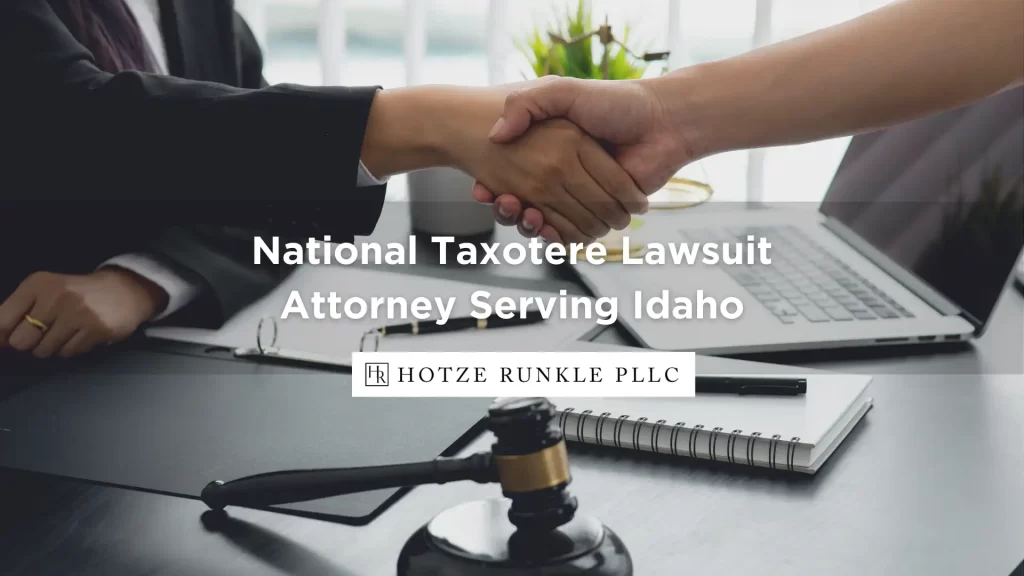
Were you or a loved one prescribed Taxotere during cancer chemotherapy treatment? Do you currently suffer from chronic watery eyes? Persistent watery eyes, which is called epiphora, is a side effect of Taxotere that drug manufacturers did not initially disclose. If you are experiencing this symptom, you might be entitled to compensation.
The American Cancer Society estimates that Idaho will see over 8,500 new cases of cancer in 2020, including more than 1,300 instances of breast cancer. Many of these Idahoans will undergo chemotherapy as part of their cancer treatment. Chemotherapy is often associated with a wide variety of negative side effects, such as nausea, vomiting, diarrhea, hair loss, and more. However, most side effects usually go away once treatment stops.
Unfortunately, Taxotere has been found to cause a permanent syndrome called canalicular stenosis, which prevents tears from draining back into your eyes and causes a feeling of uncontrollable eye-watering or crying. The manufacturer of Taxotere, Sanofi-Aventis, was aware of this side effect when they conducted clinical trials of Taxotere, but they hid this information from the Federal Drug Administration. This deceit means that countless cancer survivors now unnecessarily suffer from canalicular stenosis.
On behalf of victims of Taxotere, the Idaho Taxotere eye injury lawyers from the firm Hotze Runkle PLLC are currently taking legal action against Sanofi-Aventis. If you took the drug Taxotere and are now suffering from persistent watery eyes, you might qualify to be a part of this lawsuit. Take our quiz today to see if you qualify.
Why Do I Need A Lawyer?
Standing up to a powerful pharmaceutical company like Sanofi-Aventis requires high-level skills, knowledge, and resources. To prove that it was indeed Taxotere that caused your eye disease, you will need specific legal and medical documentation that an experienced Taxotere lawyer will know how to obtain.
A knowledgeable attorney can also help protect you during any communication with Sanofi-Aventis or their lawyers. They might ask you to give a statement or answer questions that are deliberately designed to make you look bad, so Sanofi-Aventis can claim that you do not deserve compensation. A lawyer can handle communication with Sanofi-Aventis on your behalf and help reduce the chance that you’ll mistakenly say something that this deceitful company can use against you.
Additionally, an experienced attorney can help you get the maximum compensation that you deserve. Pharmaceutical companies assume that victims are unaware of how much money they are entitled to and will accept a small amount of money. Your lawyer can help determine how much compensation you can expect to receive based on your circumstances and can advise you on when to accept a settlement and when to keep fighting.
Cancer and its treatments are physically, emotionally, and financially devastating. When you finish treatment, you want to be able to focus on resting, spending time with loved ones, and enjoying your life. Cancer survivors do not deserve to suffer continued life disruption due to a preventable side effect. If you are suffering from Taxotere side effects, an experienced attorney can help you fight for the compensation that you’re owed.
Why Should I Choose Hotze Runkle PLLC?
At Hotze Runkle PLLC, we are dedicated to representing victims across Idaho who were prescribed Taxotere as part of their cancer treatment. Although we are not doctors, we have a high level of experience with Taxotere and how it causes epiphora and canalicular stenosis.
We are not simply personal injury or product liability attorneys — we focus on Taxotere eye injury representation. This helps us determine which expert witnesses to hire to support your case, which questions to ask, and how much compensation you can expect to receive.
Our hardworking attorneys are passionate about getting our clients the justice they deserve and holding pharmaceutical companies accountable for their wrongdoing. We are committed to using every legal tool available to help you get the most compensation possible.
At Hotze Runkle PLLC, we understand that many people worry about their ability to afford a lawyer. With our firm, you don’t need to worry. We believe that any victim of Taxotere should have access to the best legal representation possible, regardless of financial means. If you don’t win your case, you don’t owe us anything. We work on a contingency fee basis, which means that we only get paid an agreed-upon percentage of your overall settlement if we help you win your case.
What is Taxotere?
Taxotere is the brand name of docetaxel, a cancer chemotherapy drug that is primarily used to treat breast cancer. It can also treat lung, prostate, and head/neck cancer. The medicine works by preventing the development of cancerous cells. It is administered intravenously every one, two, or three weeks. Canalicular stenosis and epiphora can develop regardless of the frequency at which the drug was administered.
Taxotere was first used to treat cancer in 1998. Before it was released, Sanofi-Aventis conducted clinical trials to assess its efficacy and any of its side effects, as is standard with all pharmaceuticals. When pharmaceutical companies conduct these trials, they send the results to the Federal Drug Administration (FDA), which then determines whether or not the drug should be approved for widespread use.
When Sanofi-Aventis got approval from the FDA, they had failed to disclose that Taxotere causes epiphora/canalicular stenosis, even though they were aware of this through their clinical trials. It wasn’t until 2014 that the company added epiphora to the list of potential side effects caused by Taxotere.
This means that the company waited 16 years and allowed countless numbers of people with cancer to get canalicular stenosis before they acted. To be clear, Taxotere has never been the only drug available to treat cancer. There are other chemotherapy drugs that are just as effective and do not cause permanent eye injuries. If doctors and people undergoing cancer treatment had been aware of this side effect, they could have chosen these other drugs.
What Are Taxotere’s Side Effects?
Healthy eyes produce tears all day, every day. These tears help clear dust and dirt out of the eyes and keep them hydrated. Normally, these tears then drain back into the body through small tubes called canaliculus.
Taxotere causes canalicular stenosis, which is when these tubes become obstructed or close entirely, making it impossible for tears to drain back into your body. The tears then collect and overflow, causing the feeling of uncontrollable crying. This symptom of watery eyes and uncontrollable crying is called epiphora. Canalicular stenosis/epiphora can also cause:
- Headaches
- Vision changes
- Difficulty seeing
- Sensitivity to light
- Eye pain
- Blindness
For those who are not suffering from chronic eye-watering, it might not seem very serious. However, epiphora can severely affect your quality of life. It can make it difficult or impossible to drive, read, watch TV, or wear makeup. These interferences can make it challenging to go to work and live your life normally. Many who suffer from epiphora find that going into public can be humiliating and stressful.
Is Canalicular Stenosis Treatable?
In its early stages, people can manage the symptoms of canalicular stenosis with eye drops that decrease inflammation and irritation. If you are suffering from watery eyes, visit an ophthalmologist, and explain that you took Taxotere and are worried about its long-lasting side effects.
Because Sanofis-Aventis hid this side effect for so long, many doctors might still not be aware of it, so don’t be surprised if your physician hasn’t heard of Taxotere-caused canalicular stenosis. However, it’s critical to advocate for your situation. If the canaliculus (the tube through which tears drain from your eyes) closes up completely, your only option is an invasive and expensive surgery called Dacryocystorhinostomy (DCR).
DCR places a stent, which is a very small tube through which tears can pass through to drain directly into your nasal cavity. This surgery can be effective, but it has some side effects and complications, which include:
- Scarring, which can be permanent
- Post-surgery infection
- Eye bleeding
- Displaced stent
- Rejected stent
- Tissue damage
- Partial or complete blindness
How Much Money is My Case Worth?
 The type of legal claim you can make against Sanofi-Aventis is called a product liability claim. In these types of cases, victims are eligible for two types of compensation: economic and non-economic.
The type of legal claim you can make against Sanofi-Aventis is called a product liability claim. In these types of cases, victims are eligible for two types of compensation: economic and non-economic.
Economic damages are those for which money is an exact substitution. These are your medical bills and any lost wages if your epiphora/canalicular stenosis has made you unable to work. In order to make a case for economic damages, you’ll need to prove that your eye issues are a direct result of Taxotere. An experienced attorney might hire a medical professional to examine you and testify in court that your injuries are the result of Taxotere use.
Non-economic damages are those for which money is an approximate, rather than a direct substitution. These damages are the pain, suffering, and emotional distress you have experienced as a result of your Taxotere eye injuries.
In order to make the case that you have incurred non-economic damages, it’s helpful if you document in a journal every time that your epiphora makes it difficult to live your life normally. For example, if you love to read but now find yourself unable to focus on a page due to your epiphora, write this down.
Take Our Quiz to See if You Qualify for Compensation
If you suffer from persistent watery eyes after undergoing Taxotere treatment, you might be eligible for significant compensation. Take our free quiz today to see if you qualify.
The intentionally deceitful actions of Sanofi-Aventis have caused permanent eye damage to countless victims. This negligent company needs to be held accountable for their actions, and you deserve financial compensation.